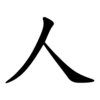人
Jump to navigation
Jump to search
 | ||||||||
| ||||||||
Translingual[edit]
| Stroke order | |||
|---|---|---|---|
| Stroke order | |||
|---|---|---|---|

| |||
Alternative forms[edit]
- 亻 (when used as a left radical)
Han character[edit]
人 (radical 9, 人+0, 2 strokes, cangjie input 人 (O), four-corner 80000, composition ⿸丿乀)
- Kangxi radical #9, ⼈.
Derived characters[edit]
References[edit]
- KangXi: page 91, character 1
- Dai Kanwa Jiten: character 344
- Dae Jaweon: page 190, character 1
- Hanyu Da Zidian (first edition): volume 1, page 101, character 10
- Unihan data for U+4EBA
Chinese[edit]
Glyph origin[edit]
| Historical forms of the character 人 | ||||||||||||||||||||||||||||||||||||||||||||||||||||||||||||||||||||||||||||||||||||||||||||||||||||||||||||||||||||||||||||||||||||||||||||||||||||||||||||||||||||||||||||||||||||||||||||||||||||||||||
|---|---|---|---|---|---|---|---|---|---|---|---|---|---|---|---|---|---|---|---|---|---|---|---|---|---|---|---|---|---|---|---|---|---|---|---|---|---|---|---|---|---|---|---|---|---|---|---|---|---|---|---|---|---|---|---|---|---|---|---|---|---|---|---|---|---|---|---|---|---|---|---|---|---|---|---|---|---|---|---|---|---|---|---|---|---|---|---|---|---|---|---|---|---|---|---|---|---|---|---|---|---|---|---|---|---|---|---|---|---|---|---|---|---|---|---|---|---|---|---|---|---|---|---|---|---|---|---|---|---|---|---|---|---|---|---|---|---|---|---|---|---|---|---|---|---|---|---|---|---|---|---|---|---|---|---|---|---|---|---|---|---|---|---|---|---|---|---|---|---|---|---|---|---|---|---|---|---|---|---|---|---|---|---|---|---|---|---|---|---|---|---|---|---|---|---|---|---|---|---|---|---|---|
| Shang | Western Zhou | Spring and Autumn | Warring States | Shuowen Jiezi (compiled in Han) | Liushutong (compiled in Ming) | |||||||||||||||||||||||||||||||||||||||||||||||||||||||||||||||||||||||||||||||||||||||||||||||||||||||||||||||||||||||||||||||||||||||||||||||||||||||||||||||||||||||||||||||||||||||||||||||||||||
| Bronze inscriptions | Oracle bone script | Bronze inscriptions | Bronze inscriptions | Bronze inscriptions | Chu Slip and silk script | Qin slip script | Odd character | Small seal script | Transcribed ancient scripts | |||||||||||||||||||||||||||||||||||||||||||||||||||||||||||||||||||||||||||||||||||||||||||||||||||||||||||||||||||||||||||||||||||||||||||||||||||||||||||||||||||||||||||||||||||||||||||||||||

|

|

|

|

|

|

|

|

|

| |||||||||||||||||||||||||||||||||||||||||||||||||||||||||||||||||||||||||||||||||||||||||||||||||||||||||||||||||||||||||||||||||||||||||||||||||||||||||||||||||||||||||||||||||||||||||||||||||
|
| ||||||||||||||||||||||||||||||||||||||||||||||||||||||||||||||||||||||||||||||||||||||||||||||||||||||||||||||||||||||||||||||||||||||||||||||||||||||||||||||||||||||||||||||||||||||||||||||||||||||||||
|
References:
Mostly from Richard Sears' Chinese Etymology site (authorisation),
| ||||||||||||||||||||||||||||||||||||||||||||||||||||||||||||||||||||||||||||||||||||||||||||||||||||||||||||||||||||||||||||||||||||||||||||||||||||||||||||||||||||||||||||||||||||||||||||||||||||||||||
Pictogram (象形) – side view of a standing man, highlighting the arms and legs. Compare 大.
Etymology 1[edit]
| simp. and trad. |
人 | |
|---|---|---|
| alternative forms | ||
Sagart (1999) relates it to Tibetan ཉེན (nyen, “relative”), from ཉེ (nye, “near”) + nominalizing suffix -n; if so, from Proto-Sino-Tibetan *s-naːj ~ *s-nej (“near”).
Schuessler (2007) proposes two etymologies:
- Same etymon as 仁 (OC *njin, “to be kind; to be good”), from Proto-Sino-Tibetan *s/k-niŋ (“heart; brain; mind”). The semantic association of 仁 with 人 was somewhat late, dated to Mencius's time; later on, 仁 would be usually interpreted as "humane, acting like a human being".
- Related to Proto-Mon-Khmer *ɲaʔ ~ *ɲah (“person”) with a nominalizing suffix -n, from the auto-ethnonym of a hostile, possibly Austroasiatic-speaking, eastern people, whom the Sinitic-speaking Shang referred to as 人方 (OC *njin paŋ).
Pronunciation[edit]
Definitions[edit]
人
- man; person; people (Classifier: 個/个 m c; 隻/只 h)
- human being (Homo sapiens)
- body
- This term needs a translation to English. Please help out and add a translation, then remove the text
{{rfdef}}. - everybody; everyone
- physical, psychological or moral quality or condition; character; personality
- a person associated with a particular identity or trait; -er
- manpower; worker; employee
- † talent; person of talent
- † other people; others
- 人云亦云 ― rényún yìyún ― to follow the crowd (lit. to say what others say)
- † common people; commoner
- † adult; grown-up
- † reason; cause
- † sexual intercourse
- † company; companion; friend
- † artificial; man-made
- † mortal; bodily; earthly
- † Alternative form of 仁 (rén, “kernel”).
- † Alternative form of 仁 (rén, “charity”).
- † Alternative form of 仁 (rén, “loving; kind”).
- (Beijing) Lenition of 人家 (rénjia).
- (Taishanese) paternal grandmother
Synonyms[edit]
Dialectal synonyms of 人 (“man; person”) [map]
Descendants[edit]
Compounds[edit]
Derived terms





























































































































































































